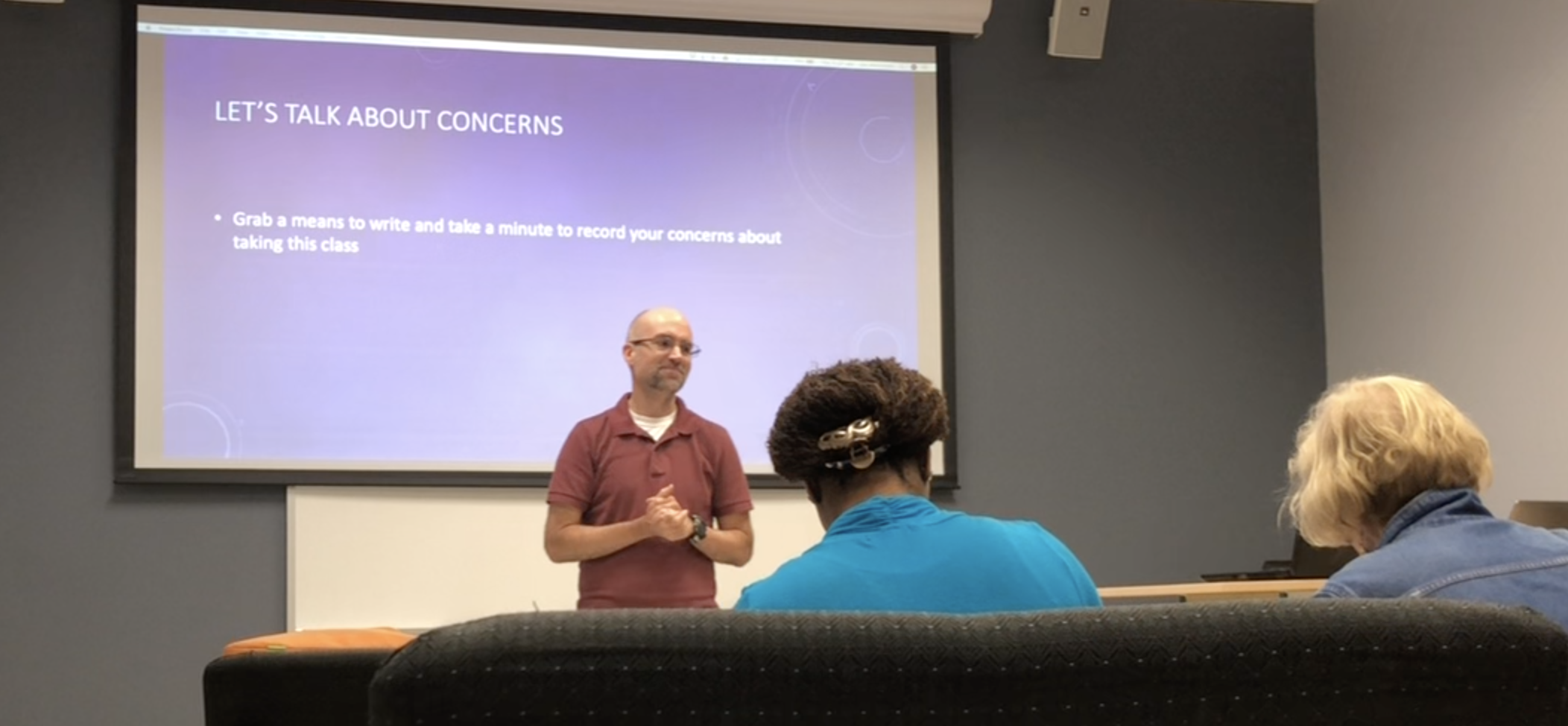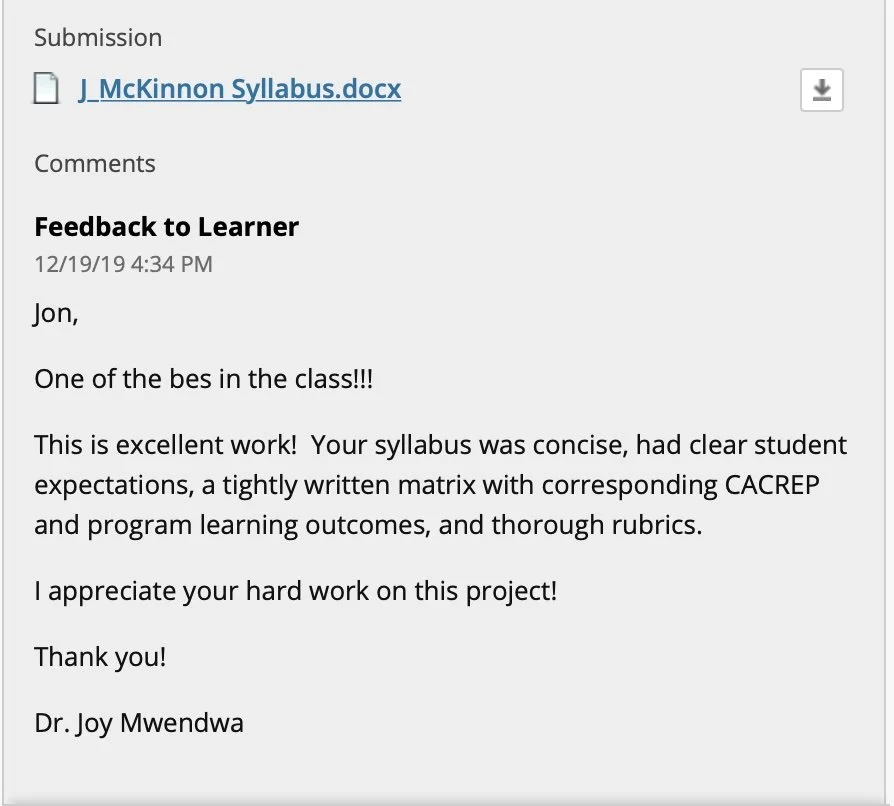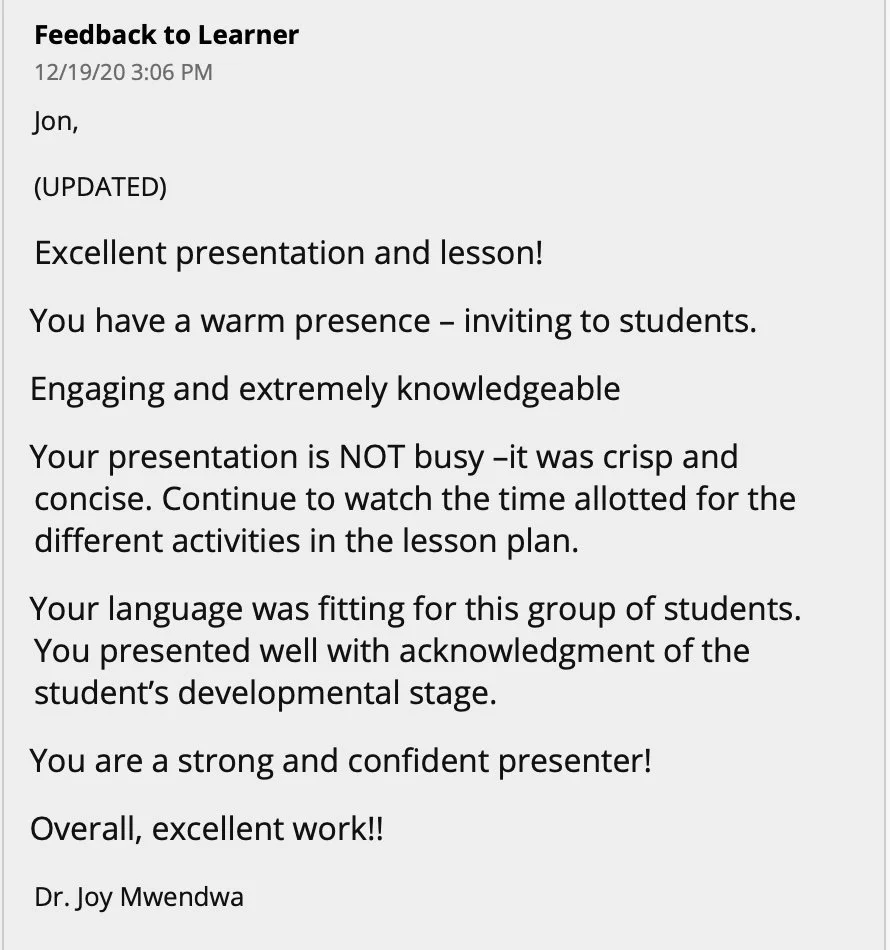
Teaching
CACREP TEACHING STANDARDS
a. roles and responsibilities related to educating counselors
b. pedagogy and teaching methods relevant to counselor education
c. models of adult development and learning
d. instructional and curriculum design, delivery, and evaluation methods relevant to counselor education
e. effective approaches for online instruction
f. screening, remediation, and gatekeeping functions relevant to teaching
g. assessment of learning
h. ethical and culturally relevant strategies used in counselor preparation
i. the role of mentoring in counselor education
Reflections
Teaching is one of my passions and is my primary spiritual gift. I find great pleasure in helping others discover new knowledge and hopefully stir a passion for lifelong learning. My time at Liberty was not my first entry into teaching – I have taught school, Sunday school, psychoeducational classes, seminars, workshops, and more. However, Liberty has allowed me to teach master-level counseling students, which has been a rewarding challenge. My class in counselor education was undoubtedly helpful in establishing a foundation for counselor education and reminding me of the importance of concepts like Bloom’s taxonomy. Still, the most significant impact came from teaching with Dr. Ford and Dr. Lilley. That mentoring process helped hone my skills and allowed me to be intimately involved in teaching and student interaction. You can learn in the classroom, but sometimes, the best teacher is experience.
If I gathered any benefit from the COVID pandemic, it helped me strengthen my ability to provide presentations online. After I completed the counselor education class, I remembered reading about ways to use technology to aid in presentations. This was extremely helpful when all of our classes had to go online. During class, I noticed that several people couldn't talk at once. This, of course, resulted in people cutting out, which often created a hesitancy for anyone else to speak, as they did not want to cut off anyone else. Wanting to engage with others in my presentation without this difficulty, I incorporated technology like Menti. This technology helped me engage the entire class and receive feedback without the distracting dropouts. I can incorporate what I learned from this period into my in-person presentations, as it makes it possible to connect and gather information from a large number of people. In addition, the feedback they provide is anonymous, which helps some people communicate when they otherwise would not.
I grew up in an era when lectures were the primary means of delivering information. Secondly, I have been in ministry for a long time and have prepared and delivered many sermons. I like a good lecture, but I know this is no longer the preferred delivery method; that is when it is the only way to teach. Yet Dr. Deacon reminded my teaching internship class, “There is a place for a lecture in teaching.” Knowing when to use this approach effectively has been a challenge, as I have had to ensure I am not solely lecturing, and I am seeking to engage students’ learning using multiple tools and approaches. I believe I have improved over my time at Liberty, and as previously mentioned, COVID prompted me to become even more creative. I plan to continue to push myself in innovative ways to teach and engage with students.
As mentioned previously, teaching is one of my spiritual gifts. Teaching others also allows us to embody who Christ is, as he was an exemplary teacher. He is a model teacher, and seeking out how he connected with so many people is a wise decision. Jesus used creativity in his teaching by interweaving stories that can be easily remembered. This resonates with me deeply as a storyteller, and I often weave stories into my teaching style. People usually connect with stories, and I have received positive feedback from my students on using my stories as a teaching tool.
Artifacts
Artifact 1
Since the following artifacts will cover my competency in teaching, it is essential to begin with my philosophy of teaching statement. This was written in COUC 747, covering counselor education. This document illustrates how I see my roles/responsibilities as a counselor educator (a), my methods of teaching (b), how students learn (c), how I will assess them for learning (g), how I apply my methods to diverse populations (h), and how mentoring should be utilized as a counselor educator (i).
Artifact 2
The following assignment was a reflective journal written during my COUC 747 class. The journal had us reflect on multiple core areas. This included the role of a counselor educator (a), defining effective pedagogy (b), exploring how adults learn (c), considering the work involved in designing a class (d), examining the complexities involved in teaching online (e), knowing the requirements of being a gatekeeper (f), assessing outcomes of my students (g), reflecting on cultures impact on teaching strategies (h), and understanding the boundaries that need to be followed by an effective mentor (i).
Teaching group counseling online with Dr. Ford.
Artifact 3
This is a syllabus I had to design in COUC 747. Developing a syllabus required me to meet standard a, as creating a syllabus is part of the counselor educator’s job. I addressed standard d in the syllabus by showing how I would deliver and evaluate learning. Finally, my syllabus contains example test questions, which is standard g.
Some feedback I received about my syllabus.
Artifacts 4 & 5
Artifacts 4 and 5 are lesson plans I developed during my teaching internship. You can see me execute the first lesson plan on my teaching bonus page, where I include reproductions. Creating a lesson plan is part of my role as a counselor educator (a), displays the teaching methods I will use (b) to target adult learners (c), illustrates how I can design a lesson (d), and shows how I will check for learning during class (g).
Artifacts 6 & 7
Artifacts 6 and 7 reflect my experience teaching my lesson plans. This shows my ability to assess my effectiveness at teaching, one of the roles of a counselor educator (a).
Artifact 8
This is a PowerPoint presentation from one of the lessons I developed in my COUC 747 class. This relates to standards b and d., demonstrating my teaching methods and ability to design a class. This link will send you to my Dropbox account. For the best viewing experience, you can open it in PowerPoint since it will not render well in the Dropbox viewer (images are distorted, and colors are not displayed). If you do not have PowerPoint, here is a PDF copy (The seconds starting in slide 17 are a visual timer that counts down in PowerPoint).
Artifact 9
This assignment is the lesson plan that goes with the previous PowerPoint. Like the last lesson plans, this also meets the standards identified under artifacts 4 & 5. This lesson plan is provided to go along with Artifact 8
Some more feedback I recived in my counselor education class.
Artifacts 10 & 11
Artifact 10 is the feedback I received from my students during my teaching internship, while artifact 11 is feedback from Dr. Ford, my supervisor for my internship. I was assessed for my ability to feel the role of a counselor educator in the classroom (a), teach effectively (b), and deliver a lesson (d). Since this class was conducted online, my methods of teaching online would have played a role in my evaluation (e). I was also evaluated on how I assessed my students (g).
This is a brief clip of my peers giving me gracious feeback immediately after completing my teaching demonstration in COUC 747.
Reproductions & Other Artifacts
The following link will bring you to my teaching bonus page, which includes teaching reproductions. It is password-protected.

Teaching Experience
Group Methods
Liberty University, Lynchburg, VA
15-week online/intensive, Spring 2023
Group Consultant and Teaching Assistant
Group Methods
Liberty University, Lynchburg, VA
15-week online with weekly meetings, Spring 2022
Teaching internship
Counseling Practicum
Liberty University, Lynchburg, VA
16-week online with weekly meetings, Spring 2022
Supervision Internship
Introduction to Psychology
Welch College, Gallatin, TN
Invited lecturer, Fall 2022
Provided an overview of Schema Therapy and counseling in a nonprofit
Counseling Practicum
Liberty University, Lynchburg, VA
Invited Lecturer, Fall 2021
Integration of Ignatian Spirituality in Counseling


